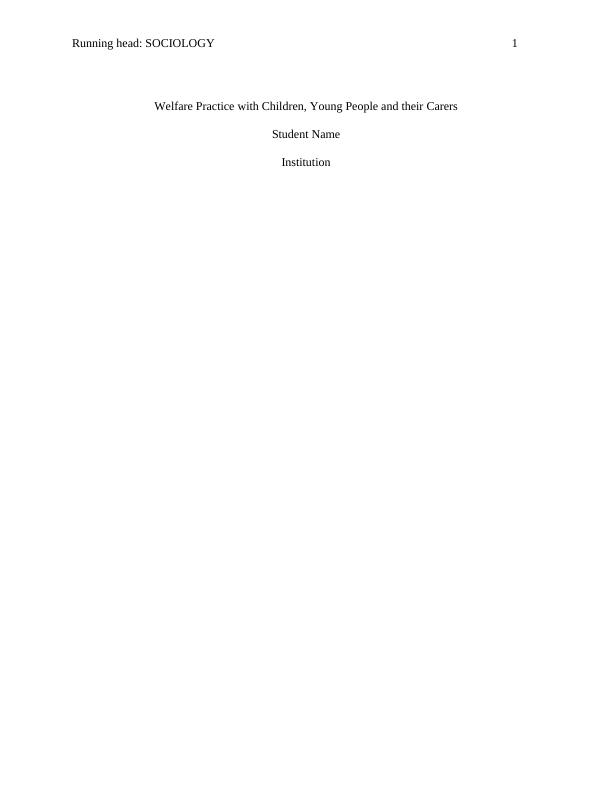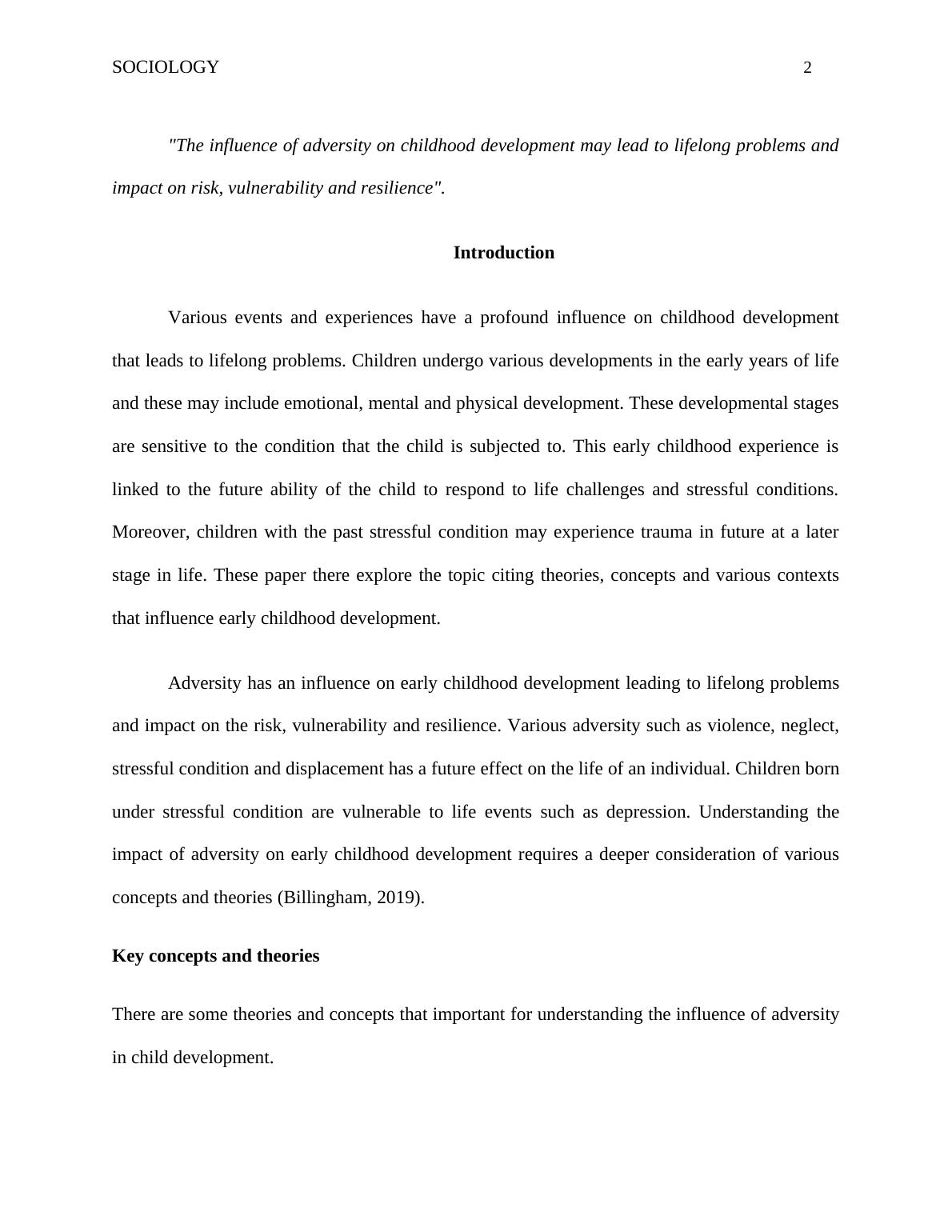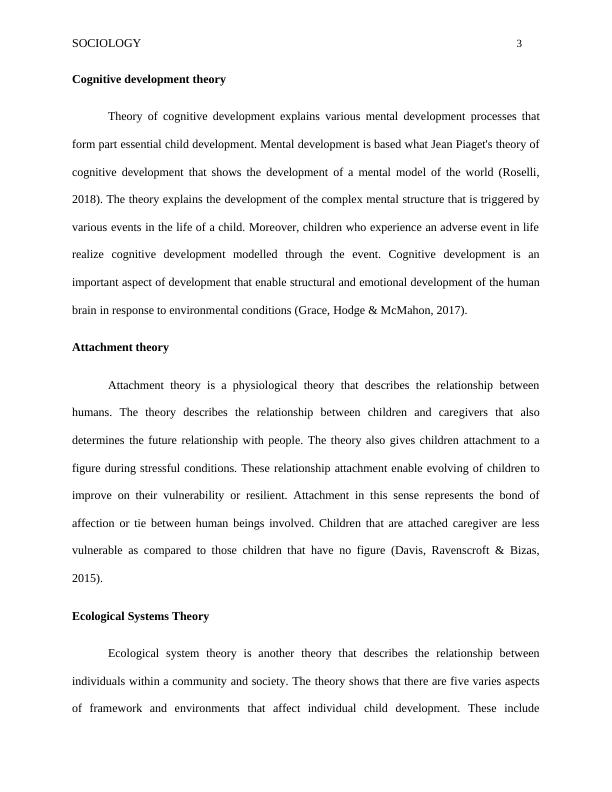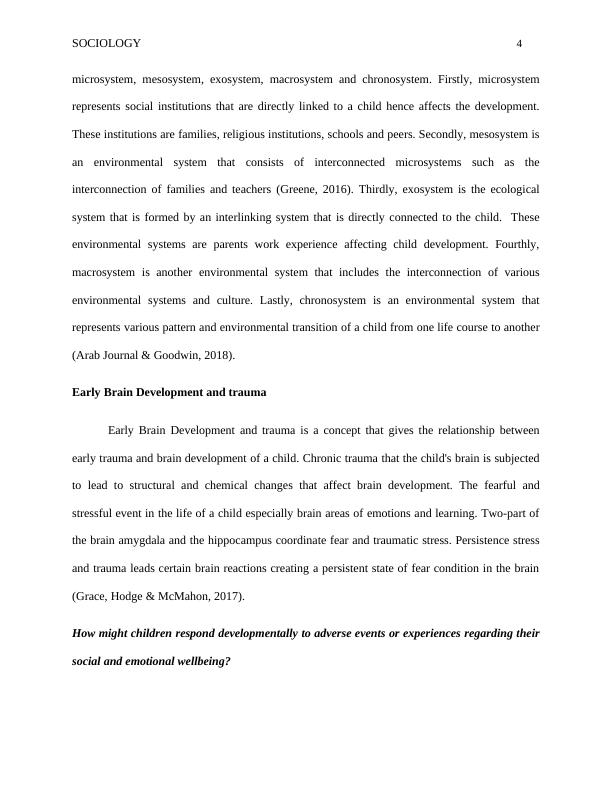Welfare Practice with Children, Young People and their Carers Research Paper 2022
Added on 2022-09-14
12 Pages2765 Words15 Views
Running head: SOCIOLOGY 1
Welfare Practice with Children, Young People and their Carers
Student Name
Institution
Welfare Practice with Children, Young People and their Carers
Student Name
Institution

SOCIOLOGY 2
"The influence of adversity on childhood development may lead to lifelong problems and
impact on risk, vulnerability and resilience".
Introduction
Various events and experiences have a profound influence on childhood development
that leads to lifelong problems. Children undergo various developments in the early years of life
and these may include emotional, mental and physical development. These developmental stages
are sensitive to the condition that the child is subjected to. This early childhood experience is
linked to the future ability of the child to respond to life challenges and stressful conditions.
Moreover, children with the past stressful condition may experience trauma in future at a later
stage in life. These paper there explore the topic citing theories, concepts and various contexts
that influence early childhood development.
Adversity has an influence on early childhood development leading to lifelong problems
and impact on the risk, vulnerability and resilience. Various adversity such as violence, neglect,
stressful condition and displacement has a future effect on the life of an individual. Children born
under stressful condition are vulnerable to life events such as depression. Understanding the
impact of adversity on early childhood development requires a deeper consideration of various
concepts and theories (Billingham, 2019).
Key concepts and theories
There are some theories and concepts that important for understanding the influence of adversity
in child development.
"The influence of adversity on childhood development may lead to lifelong problems and
impact on risk, vulnerability and resilience".
Introduction
Various events and experiences have a profound influence on childhood development
that leads to lifelong problems. Children undergo various developments in the early years of life
and these may include emotional, mental and physical development. These developmental stages
are sensitive to the condition that the child is subjected to. This early childhood experience is
linked to the future ability of the child to respond to life challenges and stressful conditions.
Moreover, children with the past stressful condition may experience trauma in future at a later
stage in life. These paper there explore the topic citing theories, concepts and various contexts
that influence early childhood development.
Adversity has an influence on early childhood development leading to lifelong problems
and impact on the risk, vulnerability and resilience. Various adversity such as violence, neglect,
stressful condition and displacement has a future effect on the life of an individual. Children born
under stressful condition are vulnerable to life events such as depression. Understanding the
impact of adversity on early childhood development requires a deeper consideration of various
concepts and theories (Billingham, 2019).
Key concepts and theories
There are some theories and concepts that important for understanding the influence of adversity
in child development.

SOCIOLOGY 3
Cognitive development theory
Theory of cognitive development explains various mental development processes that
form part essential child development. Mental development is based what Jean Piaget's theory of
cognitive development that shows the development of a mental model of the world (Roselli,
2018). The theory explains the development of the complex mental structure that is triggered by
various events in the life of a child. Moreover, children who experience an adverse event in life
realize cognitive development modelled through the event. Cognitive development is an
important aspect of development that enable structural and emotional development of the human
brain in response to environmental conditions (Grace, Hodge & McMahon, 2017).
Attachment theory
Attachment theory is a physiological theory that describes the relationship between
humans. The theory describes the relationship between children and caregivers that also
determines the future relationship with people. The theory also gives children attachment to a
figure during stressful conditions. These relationship attachment enable evolving of children to
improve on their vulnerability or resilient. Attachment in this sense represents the bond of
affection or tie between human beings involved. Children that are attached caregiver are less
vulnerable as compared to those children that have no figure (Davis, Ravenscroft & Bizas,
2015).
Ecological Systems Theory
Ecological system theory is another theory that describes the relationship between
individuals within a community and society. The theory shows that there are five varies aspects
of framework and environments that affect individual child development. These include
Cognitive development theory
Theory of cognitive development explains various mental development processes that
form part essential child development. Mental development is based what Jean Piaget's theory of
cognitive development that shows the development of a mental model of the world (Roselli,
2018). The theory explains the development of the complex mental structure that is triggered by
various events in the life of a child. Moreover, children who experience an adverse event in life
realize cognitive development modelled through the event. Cognitive development is an
important aspect of development that enable structural and emotional development of the human
brain in response to environmental conditions (Grace, Hodge & McMahon, 2017).
Attachment theory
Attachment theory is a physiological theory that describes the relationship between
humans. The theory describes the relationship between children and caregivers that also
determines the future relationship with people. The theory also gives children attachment to a
figure during stressful conditions. These relationship attachment enable evolving of children to
improve on their vulnerability or resilient. Attachment in this sense represents the bond of
affection or tie between human beings involved. Children that are attached caregiver are less
vulnerable as compared to those children that have no figure (Davis, Ravenscroft & Bizas,
2015).
Ecological Systems Theory
Ecological system theory is another theory that describes the relationship between
individuals within a community and society. The theory shows that there are five varies aspects
of framework and environments that affect individual child development. These include

SOCIOLOGY 4
microsystem, mesosystem, exosystem, macrosystem and chronosystem. Firstly, microsystem
represents social institutions that are directly linked to a child hence affects the development.
These institutions are families, religious institutions, schools and peers. Secondly, mesosystem is
an environmental system that consists of interconnected microsystems such as the
interconnection of families and teachers (Greene, 2016). Thirdly, exosystem is the ecological
system that is formed by an interlinking system that is directly connected to the child. These
environmental systems are parents work experience affecting child development. Fourthly,
macrosystem is another environmental system that includes the interconnection of various
environmental systems and culture. Lastly, chronosystem is an environmental system that
represents various pattern and environmental transition of a child from one life course to another
(Arab Journal & Goodwin, 2018).
Early Brain Development and trauma
Early Brain Development and trauma is a concept that gives the relationship between
early trauma and brain development of a child. Chronic trauma that the child's brain is subjected
to lead to structural and chemical changes that affect brain development. The fearful and
stressful event in the life of a child especially brain areas of emotions and learning. Two-part of
the brain amygdala and the hippocampus coordinate fear and traumatic stress. Persistence stress
and trauma leads certain brain reactions creating a persistent state of fear condition in the brain
(Grace, Hodge & McMahon, 2017).
How might children respond developmentally to adverse events or experiences regarding their
social and emotional wellbeing?
microsystem, mesosystem, exosystem, macrosystem and chronosystem. Firstly, microsystem
represents social institutions that are directly linked to a child hence affects the development.
These institutions are families, religious institutions, schools and peers. Secondly, mesosystem is
an environmental system that consists of interconnected microsystems such as the
interconnection of families and teachers (Greene, 2016). Thirdly, exosystem is the ecological
system that is formed by an interlinking system that is directly connected to the child. These
environmental systems are parents work experience affecting child development. Fourthly,
macrosystem is another environmental system that includes the interconnection of various
environmental systems and culture. Lastly, chronosystem is an environmental system that
represents various pattern and environmental transition of a child from one life course to another
(Arab Journal & Goodwin, 2018).
Early Brain Development and trauma
Early Brain Development and trauma is a concept that gives the relationship between
early trauma and brain development of a child. Chronic trauma that the child's brain is subjected
to lead to structural and chemical changes that affect brain development. The fearful and
stressful event in the life of a child especially brain areas of emotions and learning. Two-part of
the brain amygdala and the hippocampus coordinate fear and traumatic stress. Persistence stress
and trauma leads certain brain reactions creating a persistent state of fear condition in the brain
(Grace, Hodge & McMahon, 2017).
How might children respond developmentally to adverse events or experiences regarding their
social and emotional wellbeing?

End of preview
Want to access all the pages? Upload your documents or become a member.
Related Documents
Understanding Adversity On Childhood Development Report 2022lg...
|11
|2910
|15
Assignment on Psychology PDFlg...
|8
|2092
|119
Vulnerability to Socioeconomic Challengeslg...
|12
|3257
|11
Child Development – Case Studylg...
|8
|2617
|137
Developmental Theory - A Reviewlg...
|8
|1991
|363
Early Social Development docx.lg...
|8
|2346
|11